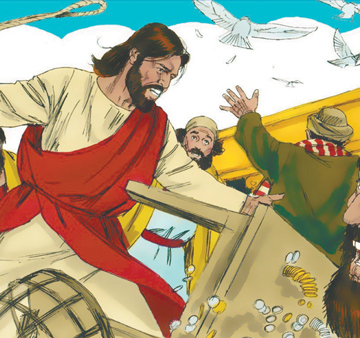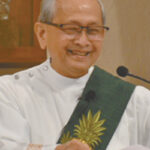
Miss Understandings Can Hurt Us
Deacon Patrick Constantino
Images by Sweet Publishing, FreeBibleimages.org
A reading from the Gospel according to John.
Since the Passover of the Jews was near, Jesus went up to Jerusalem. He found in the temple area those who sold oxen, sheep, and doves, as well as the money changers seated there. He made a whip out of cords and drove all out of the temple area, with the sheep and oxen, and spilled the coins of the money changers and overturned their tables, and to those who sold doves he said, “Take these out of here, and stop making my Father’s house a marketplace.” His disciples recalled the words of Scripture, Zeal for your house will consume me. At this the Jews answered and said to him, “What sign can you show us for doing this?” Jesus answered and said to them, “Destroy this temple and in three days I will raise it up.” The Jews said, “This temple has been under construction for forty-six years, and you will raise it up in three days?” But he was speaking about the temple of his body. Therefore, when he was raised from the dead, his disciples remembered that he had said this, and they came to believe the Scripture and the word Jesus had spoken. While he was in Jerusalem for the feast of Passover, many began to believe in his name when they saw the signs he was doing. But Jesus would not trust himself to them because he knew them all, and did not need anyone to testify about human nature. He himself understood it well.
The Gospel of the Lord. Praise to you Lord Jesus Christ. John 2: 13-25
In our Gospel it is easy to miss understand one another. Our world is full of miss understanding. Leaders of our world are not making right decisions and our innocent people are dying. Pope Francis said, “During Lent, let us find concrete ways to overcome our indifferences.”

Destroy this temple and in three days I will raise it up.
Jesus said a lot of wild things during his public ministry. He told parables that sometimes were more confusing than clear. He made statements describing a kingdom that seemed to work the opposite of the way most people thought the world worked. He challenged people to do things and believe things and embrace things that seemed to be impossible. Over time, those who knew him the best probably got somewhat used to it. But some still felt the need to ask him for explanations whenever he said something that did not make much sense.
Today, in the Gospel passage from John, we hear one such situation playing out. Some present in the temple area were pushing Jesus to do something miraculous. (This was after his scolding of some money changers. I wonder what they thought about that!) And while Jesus does not just perform a miracle on command, he does tell them what he has the power to do.
Destroy this temple and in three days I will raise it up.
This might be one of the most outrageous things Jesus ever said. After all, the people had been working on the building of the temple for decades. And instead of just letting it go, they press him to explain. Jesus does not disappoint. But what he says is even more outrageous than his first claim. Jesus, doing what he often did, had been engaging in a sort of wordplay with them. They assumed (understandably) he was talking about the building they were all looking at. But he was not.

He was talking about His body!
No one present would ever have done such a thing nor would have even believed such a thing could be true. The temple was a holy place—the holiest. Was Jesus saying HE was as HOLY as the temple, the place where God dwelled?
You bet He was!
It is a beautiful image when you really think about it. And what is even more beautiful is it is not a term that only rightfully applies to Jesus. It is also a term the Church uses to describe our own bodies—yours and mine—the ones we see in the mirror every day and wonder disappointedly, “What happened?”
Most of us do not like our bodies. Some of us do not really like ourselves. And many of us are not sure we are capable of doing the things God is asking of us—certain that our faults and limitations and weaknesses would make true faithfulness and impossibility. I am a temple? That is kooky talk.
But it is true!
When you get up in the morning, we should thank God for giving us another day of life! Our body of Christ which He gave us. We prepare the Body of Christ—by brushing our teeth, combing our hair, washing our faces and getting dressed to go to work to make a salary to support our families and make a living to put food on the family tables. This is the same temple God is talking about. Our temple that God gave us!
Of course, not exactly in the same way as it is true for Jesus. After all, he is God and we are NOT! He is perfection and we are NOT! He is the Savior of the world and we are NOT! Yet, the term applies, nonetheless.

It applies because:
God created us—and that means we are good (no matter what we do or do not do).
God made us in his image—and that means we have a dignity which we can never forfeit.
God loves us beyond all measures—and so even the seemingly impossible from us is possible.
And Jesus promised to send his Spirit—which means God does indeed dwell within each of us (and in every person open to his grace).
In other words, we were created a certain way, for a certain purpose, with God-given dignity and to be holy—this is, be people who embody and share with the world every good thing—Kindness, Mercy, Generosity, Compassion, Love—you name it! And when we see ourselves that way, we will see the Ten Commandments in a new light.
No longer will they just seem like rules imposed from outside. Rather, they will seem like deep truths—truths that simply articulate who we are at our core—exactly who we were created to be—that is, what is most real and authentic in each of us!
Put simply, living out the Ten Commandments is each one of us living in a way that is consistent with who we are in the deepest sense. And living that way, my friends, is entirely possible. That is our calling. That is what will make us happy and fulfilled. And that is both a challenge and a promise—coming from our God who is not far away but is closer than we could ever imagine.
A temple?
Jesus was a perfect one!
No doubt about it!
May we also strive to be the best temples we can be—trusting God will raise us up too!
God is Good? All the time? All the time? God is Good!
Keep the Faith! Share the Love!
Jesus, I trust in you, Amen!
 On July 1, 2022, Patrick Constantino retired as a Deacon for the Roman Catholic Church in Hawai‘i, after serving for thirty-five years and becoming on June 18, 1987, the first Deacon of Filipino ancestry for the Roman Catholic Church in Hawai‘i. For twenty-two years, he served as Administrator at Holy Rosary Church in Pā‘ia, St. Rita Church in Ha‘ikū and St. Gabriel Church in Ke‘anae. His last assignment before retiring was at St. Joseph Church in Makawao.
On July 1, 2022, Patrick Constantino retired as a Deacon for the Roman Catholic Church in Hawai‘i, after serving for thirty-five years and becoming on June 18, 1987, the first Deacon of Filipino ancestry for the Roman Catholic Church in Hawai‘i. For twenty-two years, he served as Administrator at Holy Rosary Church in Pā‘ia, St. Rita Church in Ha‘ikū and St. Gabriel Church in Ke‘anae. His last assignment before retiring was at St. Joseph Church in Makawao.
Prior to his ordination, Constantino was in government—first appointed in 1966 as Assistant Sergeant of Arms by the Speaker of the House Elmer F. Cravalho. When Cravalho became Maui’s first Mayor, Constantino became his Executive Assistant—the first of Filipino ancestry. Later, Constantino became the first County Treasurer of Filipino ancestry and the first County Grants Administrator and Risk Manager of Filipino ancestry.
Constantino is married to his lovely wife Corazon for sixty-two years. They are blessed with four children, eleven grandchildren, and fifteen great grandchildren.
